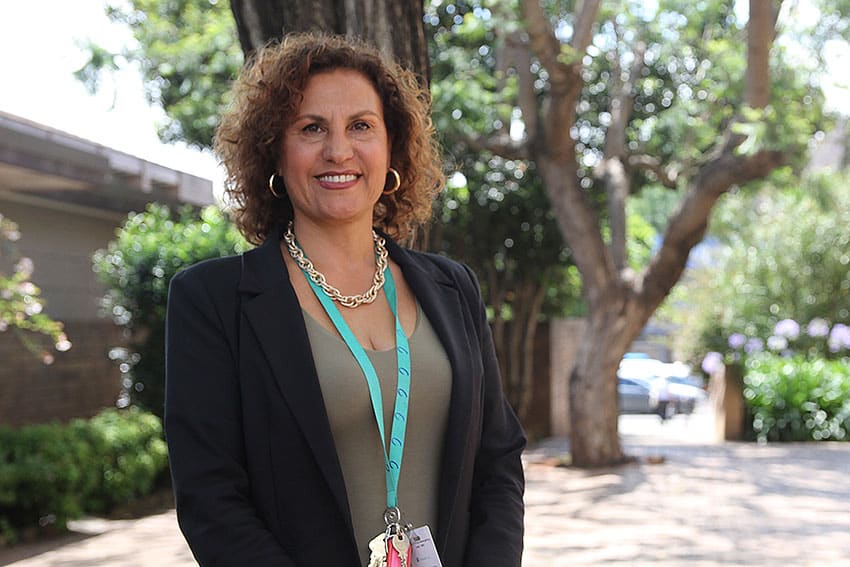
Juliette Kirkwood began work as a Community Care Worker in CatholicCare’s parish program a year and a half ago, but grew up in South-Western Sydney like many Christians of Middle Eastern heritage.
She saw the area transform and evolve from a largely Anglo-Saxon population to the diverse region it is today, beginning with the first wave of refugees after the Vietnam War, then the Gulf War, and Syria.
She has also observed another change: a broad-based decline of mental health in populations who struggled through “hard” lockdowns during the 2021 COVID-19 Delta wave.
A world of migrants and refugees
Kirkwood, a trained psychotherapist, “triages” parishioners at Liverpool and Fairfield parishes, helping them to access specialist care or just providing a safe entry-point into government health programs.
She sees a broad cross-section of the community in South-Western Sydney, especially migrants and refugees.
“Australia was not what they expected it to be,” Kirkwood said.
Plenty of regulation – little connection
Migrants are grateful for the stability they enjoy in Sydney, and especially for the services and social safety net they can access.
“The thing they complained about – although they wouldn’t openly complain about this – is that they thought Australia was over-regulated,” Kirkwood said.
“They don’t want to seem ungrateful, but at the same time they feel it’s counterbalanced by the fact there’s no social structures in place, no sense of community, people are really disconnected from each other, it’s very individualistic, very competitive – and over regulated.
Bringing back bad memories
“Once the lockdowns happened and the health orders came into place, the overregulation became acutely overregulated, to the point where it became a bit triggering.”
Seeing soldiers on the streets and helicopters in the air, as well as the experience of being locked down, sparked acute mental health problems in vulnerable populations across South-Western Sydney.
“Seeing people blown up in front of them [in their countries of origin], bombs, being terrorised by militia, injuries – a lot of them have permanent damage to their emotional health as a result.
Seeing mental health degrade
“Even though [politicians and health officials] are on TV saying the right things, trying to reassure members of the public not to be upset by the presence of so many police in the street, they can’t help it.
“It’s in their nervous system, they come from a trauma background. They’re automatically going to go into fight/flight when they experience these things.”
Kirkwood was disappointed to see many of her clients’ mental health degrade.
She saw people who had been managing well with some indicators of poor mental health suddenly descend into acute mental illness over the course of the lockdowns.
Sudden changes
Women caring for children or those with disabilities – and sometimes both – were especially vulnerable to going “from mental difficulties to actual full-blown mental illness, requiring medication” or even hospitalisation.
“I had one client who was managing her mental health quite well. She had a fullblown episode and had to be hosptialised,” Kirkwood said.
“And it came down to all the anxiety around the pandemic, the lockdown, catching COVID-19 … everything.”
Double disadvantage
Migrant families were doubly-disadvantaged during the lockdowns, with older generations feeling the absence of familiar cultural rituals and youth unable to realise the freedoms they ought to have been able to enjoy in their new home.
“There was an insinuation that it was these Middle Eastern communities in Fairfield that were breaking the rules,” Kirkwood said.
There was an insinuation that it was these Middle Eastern communities in Fairfield that were breaking the rules
“Unfortunately, what’s happening is there’s this cultural difference – they’ve only been here a few years and they still have their culture with them.
“Culturally they don’t sit at home – the men go out, hang out in a café all day, play backgammon and smoke cigarettes.
“These men that hang out in the café, that’s their lifeline. That’s what keeps them buoyant socially and emotionally. When that’s taken away, they come crashing down.”
Sure, Minister
Kirkwood also pushed back against rhetoric from Health Minister Brad Hazzard, former Premier Gladys Berejiklian and others that rule-breaking was an endemic problem among Middle Eastern families – youth in particular.
Hazzard’s rhetoric was particularly sharp, at one point during the Delta wave saying COVID was “effectively using family and friends to betray other family and friends by getting the virus into those households”.
Young migrants, on arrival in Australia, were suddenly confronted with the prospect of new freedoms and ways of life, which were then rapidly suspended.
Parents consequently “lost control” of their children to some extent.
Changes for youth
“Even though the parents are very compliant and the parents are very traumatised, the younger generation they’ve come from a country where they had no freedom to a country where they’ve got a lot of freedom,” Kirkwood said.
“Rebellious teenagers all of sudden realise there’s a legal system here – it’s not society that controls the behaviour, it’s government that controls the behaviour.
“It’s like they’ve been let out of gaol.”
As the pandemic continues with no obvious end in sight, despite world-leading vaccination rates, Kirkwood believes public health officials need to adjust their focus.
In areas like Fairfield, given the effects of the last lockdown, a “trauma-informed” response is necessary, she said.
“Hindsight’s 20/20. Going forward, it would be wise for them to consider that they need to have a lot more cultural competence at the highest level with decision-makers.”
Related
- Don’t forget Fairfield (Adam’s main feature article)
- Sydney to host prayer for lockdown-weary hearts
